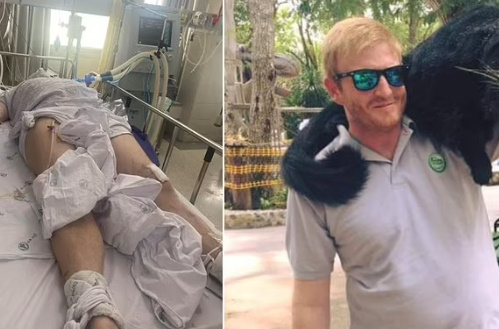James Lothian, a fly-in, fly-out mining construction worker from Gippsland, Victoria, faced a devastating situation when a car accident in Thailand left him in intensive care. Living between Perth and Thailand with his wife Sky and their three-year-old son, James thought he was covered with travel insurance. However, when the accident occurred in March, he discovered that the insurance had expired, leaving him and his family with a mountain of medical bills.
The accident, which took place in Chonburi province, southeast of Bangkok, resulted in severe internal injuries for James when the airbag in his car failed to deploy. He underwent several operations, including surgeries on his stomach and liver. Adding to the complexity of the situation was James’ rare blood type, O-negative, which is scarce in Thailand. The family issued a plea for donations, and expats and travelers rallied to provide 3.5 liters of blood for James in August. His mother, Theresa Matthews, expressed immense gratitude for the Australians who lined up to help.
Despite the support, James’ condition deteriorated. He lost over 40 kilograms and contracted sepsis, prompting his family to make desperate efforts to bring him home. With the high cost of medical repatriation—around $150,000—proving unaffordable, the family launched a GoFundMe campaign to cover expenses. Eventually, they made the decision to fly James back to Australia in business class, allowing him to lie down during the flight. He is expected to undergo surgery at Royal Perth Hospital.
Throughout the ordeal, Theresa Matthews, a volunteer wildlife carer, was unable to leave her animals in Gippsland and struggled to cope with the financial burden. Despite his deteriorating condition, James kept sending his mother daily texts, telling her, “I love you, mum,” in an effort to keep her spirits up.
This tragic experience serves as a sobering reminder of the importance of having valid travel insurance. Experts in medical repatriation stress that many people underestimate the difficulty and cost of bringing home a loved one in need of urgent medical care. While the Department of Foreign Affairs and Trade (DFAT) provides advice and crisis support for Australians abroad, it does not cover medical costs, highlighting the need for travelers to ensure they have adequate insurance.





